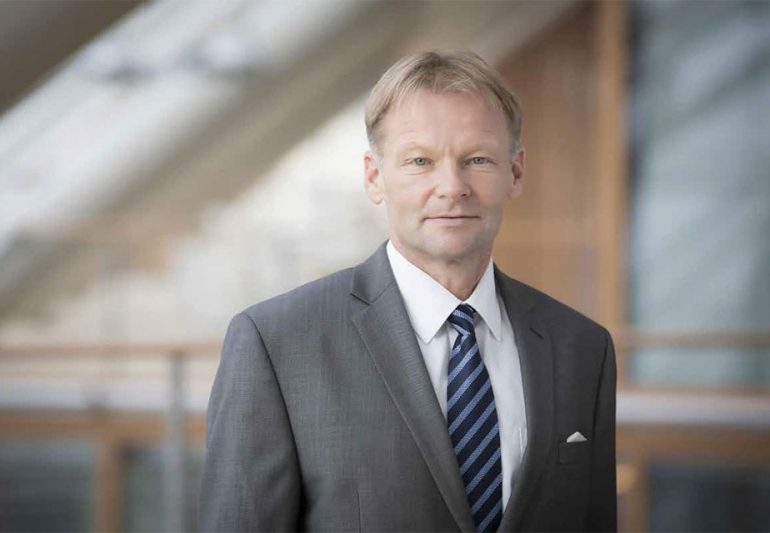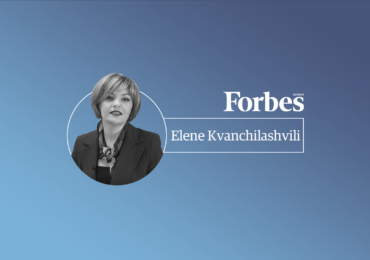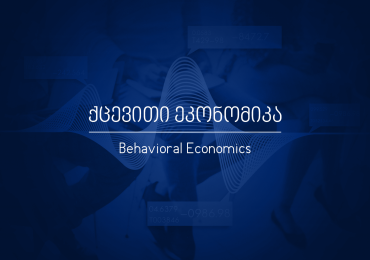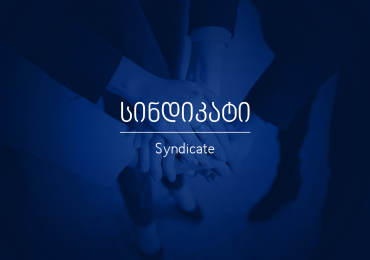This year, the European Investment Bank (EIB) celebrates its 60th anniversary and more than ten years of activity in Georgia. Vazil Hudák, the Vice-President responsible for operations in the Eastern Partnership, European cohesion countries, advisory and transport, explains what the bank has achieved and what lies ahead.
How would you define the role of the European Investment Bank (EIB) and what makes it relevant for Georgia?
The EIB is part of the EU family.
Established in 1958 to support long-term investment and with a mission to contribute to the balanced and steady development of the internal market and to enhance cohesion across Europe, the EU bank has 60 years’ experience in financing sustainable projects. It does this by financing projects in less-developed regions, addressing climate change challenges, funding projects of common interest to several member states or the European Union’s policy goals, and promoting innovation.
In addition, since 1958 it has launched operations in all EU member states and more than 160 countries worldwide. Overall, some 90% of its financing goes to projects in the EU member states and 10% to projects outside the EU.
What has EIB policy been in recent years and what are its priorities in the coming years?
In its first six decades, the EU bank has delivered investments worth over €1 trillion based on a cash contribution by the member states of €14 billion. This is not the case for any other bank. It is an excellent deal.
In the future, the EU bank wants to deliver even more to those who need more, bringing real value, real progress and impact to everybody. We strive to get better and better!
We want achieve more in development finance, especially when it comes to the European neighbourhood, as well as in support of the sustainable development goals. It is our ultimate goal to make the economy of Europe and our neighbours more innovative, cohesive, and competitive.
The EIB has a long-standing role in furthering EU external action in EU partner countries. Our flagship mandates for public and private sector financing from the European Commission enable us to support technically, economically, socially and environmentally viable projects with concrete impacts, EU visibility and political leverage in the Union’s partner countries. Furthermore, the bank’s activities in the region promote growth, employment and intra-regional trade, and help to protect our common environment and to mitigate climate change by supporting low carbon and climate resilient growth.
What are EIB’s priorities in the Eastern Partnership region?
EIB activities in this region focus on social and economic infrastructure, local private sector development and climate action. We support projects that are beneficial to both the target countries and their relationship and connection with the European Union. Balanced development and citizen well-being in the countries bordering the EU in the East are of strategic interest to us all.
By the end of 2017, EIB lending in the Eastern Partnership had reached over €8 billion, financing more than 90 investment projects and providing credit lines to support SMEs in the region.
What has the EIB achieved in Georgia so far?
The long and successful cooperation between Georgia and the EIB began with the signature of a framework agreement in 2007. At the heart of this cooperation lies the vision to promote development in Georgia and bring it toward closer integration with the European Union.
Since 2007, the EIB has supported 28 operations in different sectors of the economy at a steadily growing pace. Following the signature of the Association Agreement and the Deep and Comprehensive Free Trade Area (DCFTA) between Georgia and the EU, the EIB stepped up its support, effectively doubling its lending portfolio in the country to €1.6 billion. This makes Georgia the main EIB beneficiary in the Eastern Partnership region on a per capita basis.
Public lending represents 82% of the EIB portfolio, with a focus on transport connectivity, water, sanitation and municipal infrastructure. The remaining EIB support involves SME financing though local banks.
As an example, I would gladly mention the EIB loans in support of the Georgian Regional Development Programme, which is focused on improving the efficiency and reliability of municipal services and infrastructure throughout Georgia. Financing is currently allocated to the rehabilitation of 34 municipal roads totalling 185 kilometres, six sports facilities, six schools and kindergartens and a regional innovation center. These huge investment programmes are becoming visible in the everyday life of Georgian citizens. Georgia is an important partner for the EIB, and we are proud to have such an interesting track record of successful cooperation spanning more than ten years.
What were the EIB’s main activities in 2018?
This year we signed a €30 million loan to TBC Bank, the largest bank in Georgia, in order to broaden the access to finance of Georgian SMEs, which represent over 90% of companies active in the country. Around 600 Georgian SMEs are expected to benefit from the loan.
In addition, in 2018 we signed the Eastern Partnership Technical Assistance Trust Fund (EPTATF) grant agreement for €3.25 million with the Georgian Ministry of Regional Development and the United Water Supply Company of Georgia (the Georgian water utility company). These funds will be used for the financing of specialized professional services to support the utility in the implementation of the EIB Kutaisi Waste Water project.
We have also just recently approved a new framework loan to provide an additional €250 million of support for road investment for the Georgia Transport Connectivity Program. The implementation of the program is expected to be supported with a Technical Assistance grant of €6 million from the European Union.
Globally, investment gaps remain. We want to enhance our impact and make sure we get better at collaborating with others. There is not enough public financing in the world to address global development challenges. Catalyzing private investments is the only way to finance the achievement of the sustainable development goals. And we can deliver on that – for every €1 from the EU budget, under the European lending mandate we manage to leverage support of €40 of investment.
Therefore, the EU bank remains committed to international and multilateral cooperation. No one is stronger alone. In an interconnected world, it is absurd to think that we can achieve success in delivering global development and prosperity if we don’t work together.
What are the main challenges for Georgia in its relations with the EIB?
We have already allocated a substantial amount of funds to the Georgian private and public sectors. However, we also consider it our duty and responsibility to implement them in the most efficient way. Technical assistance grants are therefore used to improve the implementation of financed projects. This is key momentum for the project lifecycle supported by the EIB.
The majority of the projects already financed are with the public sector, therefore one of the remaining challenges is to balance the portfolio and ensure that a good variety of private companies become the clients and beneficiaries of our financing. The EU bank’s contribution to their investment programs increases the attractiveness of the investment and is certainly a good sign for other global investors to join as well.
At the same time, we believe that the cooperation offers opportunities to learn more from European companies and their know-how, as well as to absorb the good practices in the form of European procedures and policies at a national level, e.g. procurement rules according EU standards. I believe these challenges are actually opportunities for Georgia.
How active and productive are your potential lenders in Georgia (both private and state sectors)?
Active enough for Georgia to become the number one beneficiary per capita among the Eastern Partnership countries.
As the European Commission is the policy maker, we are policy takers. The activity of our counterparts in Georgia reflects and goes well with the pro-European path of the country, and is market-driven. The EIB was not created to make a profit, but rather to make investments more attractive for other investors; to crowd-in the private sector. And this remains a sufficient driver for potential lenders.
The leadership of the country is an excellent partner for strategic, but also operational discussion on the investment priorities for Georgia.
EIB’s regional representation in Tbilisi – are there any plans to expand its coverage and portfolio?
The EIB regional office in Tbilisi was inaugurated in 2015. For us, it is important to bring the EU bank closer to our clients in the entire region. It enables us to better seize lending and technical assistance opportunities, and better assess and respond to the financing needs of Georgia, Armenia and Azerbaijan.
The representation recently got a new head – Maciej Czura – who I believe will ensure that the EIB presence in Tbilisi is key for market proximity and an increased operational delivery capability for the EIB, as well as closer institutional ties with the national authorities. Our regional representation actively contributes to project identification and screening, the appraisal of new operations, and the development of new products to finance the public and private sectors.
In terms of EIB plans and estimates in Georgia beyond 2018 and plans for the next year –are there any plans regarding Georgia already confirmed by EIB headquarters?
As far as the close future is concerned, we want to enhance our impact and make sure we get better at collaborating with others. There is not enough public financing in the world to address global development challenges.
I believe the upcoming year will bring new developments on the possible financing of smart and green solutions for urban development, especially for the city of Tbilisi, and will bring another good private sector project, this time in the energy sector. Nevertheless, the Georgian government remains our main public counterpart, and I’m confident we will soon inaugurate other projects of regional importance for the everyday life of citizens.
The future is in innovation. Therefore, I am sure that investment opportunities for Georgia in this sector will also soon be identified. Yet, development of the private sector, and in particular SMEs, will remain a key objective of the EIB in Georgia, as the private sector is the key driver of economic growth, job creation and innovation in every healthy economy.
დატოვე კომენტარი
















